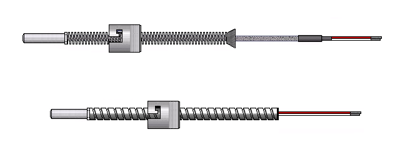
Thermocouples, small yet vital components in various temperature-measuring devices, play an indispensable role in our daily life. This article aims to demystify the different types of thermocouples, helping you grasp the science behind these powerful tools.
A thermocouple is a type of sensor used to measure temperature. It comprises two different types of metal wires connected at one end. Due to the Seebeck effect, a temperature difference between the junction and the other end of the thermocouple creates a small voltage, translating into a temperature reading.
Different types of thermocouples are needed due to the varied environments they operate in and the range of temperatures they need to measure. The most common types of thermocouples are J, K, T, E, N, S, R, and B. Each type is designed for specific applications, offering different temperature measurement ranges, sensitivity, and accuracy.
Type J thermocouples are made from iron and Constantan (a copper-nickel alloy). They are commonly used in general-purpose temperature applications and are suitable for environments up to 760°C. In addition, these thermocouples offer good sensitivity and are reliable, making them a popular choice for indoor applications such as HVAC systems and appliances.
Type K thermocouples, composed of Nickel-Chromium and Nickel-Alumel, are known for their wide temperature range (-200°C to 1250°C) and durability. They are popular in industrial applications and household appliances due to their tolerance for high temperatures and rugged conditions.
Type T thermocouples, composed of Copper and Constantan, are known for their stability and accuracy at low temperatures, making them ideal for food industry applications and environmental monitoring. Type E (Nickel-Chromium and Constantan) thermocouples provide high output and can measure a broad range of temperatures. In contrast, Type N (Nicrosil and Nisil) thermocouples are designed for high-temperature stability, suitable for industrial applications.
Types S, R, and B thermocouples are the aristocrats of thermocouples made with platinum and rhodium alloys. They offer exceptional stability and accuracy in high-temperature applications, up to 1700°C. These types are common in laboratory and industrial processes where precise temperature control is vital.
Choosing the suitable thermocouple depends on your specific needs, including the temperature range, environment, and accuracy requirements. Remember, selecting is crucial to ensuring accurate and reliable temperature measurements. Consulting with a thermocouple expert or a trusted supplier can provide valuable guidance.
The different types of thermocouples from J to B serve many purposes in our everyday lives and across industries. Understanding their distinctions helps us appreciate the sophisticated technology that goes into simple temperature measurements and controls. We encourage you to delve further into the fascinating world of thermocouples and the physics that underpins them. The more you learn, the more you'll see science in action.